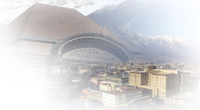A network of European universities, headed by Lynne Chisholm and involving some faces well-known to us such as Gavan Titley and Howard Williamson, is working on establishing a European Master “European Youth Studies”. The first planning meeting has just taken place at the European Youth Centre in Strasbourg, timely sponsored by the Partnership between the European Commission and the Council of Europe in the field of youth policy, youth research and youth work.
The four-semester course envisages to address two distinct target groups: on the one hand young researchers, beginning their careers in transnational and intercultural youth research and non-formal youth trainers at international level on the other hand.
Combining the two target groups makes a lot of sense: they complement each other very well and it is in the interest of both professional fields to learn from and with each other. And both groups have clear needs to which the course aims to respond. Transnational and intercultural youth research is a relatively new and dynamic interdisciplinary field of specialisation with a close relation to policymaking and educational and social practice and currently there is no comparable M.A. course on offer fostering an organic relation between research and practice. Professionals active in the intercultural and social education and training of young people and young adults need a recognised qualification at higher education level, again an offer which does not exist yet.
As a matter of basic principle, the M.A. does not differentiate between “home�? and “foreign�? students — instead, the design of the course is intercultural, for reasons of content, method and pedagogy. All course modules will address all students on an equal footing. Constructed as a European-international course, it positions itself as an active proponent of creating a European educational space.
Based on these principal assumptions and conclusions, the course will seek to address related sets of core competences:
for both target groups
- To know and critically reflect the historical and current development of European integration (social, cultural, political), with special focus on the field of education, and to relate them to globalisation processes;
- To engage in critical reflection of and further to develop scientific and practice-related concepts and theories of non-formal and informal education as well as their goal-directed and effective application in the youth field and with young adults.
- To work multi-lingually and inter-culturally in multi-ethnic contexts and to acquire, refine and practice the intercultural competences necessary in this context, in particular, in the field of communication and in teamwork and project-based work.
- To be able to sustain and strengthen the development of transversal practice-relevant networks beyond professional and cultural boundaries.
- To co-operate productively with other specialists in the fields of research, service provision, educational and social work with young people and young adults.
for youth researchers
- To possess solid research-based knowledge about the present social situation of youth and young adults in Europe, with a special focus on the relationships between multidimensional similarities and differences, on the social shaping and educational transmission of intergenerational and intra-generational relations across the life-course as a whole, and on the implications of Europeanisation and globalisation;
- To refine and deepen research competences in intercultural comparative research in the field of youth and young adults.
for youth trainers
- To refine and deepen educational and training competences in the fields of trans-national und intercultural work with young people and young adults, in particular the competence to design and implement concepts and methodologies for European-international training programmes, as well as to train other youth trainers;
- To acquire and reflect critically on professional quality criteria in the field of youth training and in its implementation in educational practice.
An ambitious project, and certainly worth to keep an eye on while emerging and developing further. We’ll keep you posted!

Comments
4 responses to “Shaping Europe’s educational space”
It looks very interesting and it seems like a first real attempt towards recognition of non formal education, ins’t it?… but is this just an experiment, or is it the spark that will light the fuse?
By the way, is it possible to apply yet?
Thanks a lot.
Nice Blog!!
Dear Diego,
thanks for your compliment about the blog :) Appreciated indeed!
I leave answering your questions to Lynne.
Andreas
And Lynne, let me add two questions myself:
Are any practitioners involved in the planning group? And will there be a(nother) time at which practitioners will get involved in the planning?
Dear Diego and Andreas,
thank you for your interest, your comments and your questions.
It can certainly contribute to the recognition of non-formal education, but don’t forget that this needs to be taken forward step-by-step.
All innovations are experiments by definition. Who knows what light will be fused…?
No, not yet. We’d like the course to start in autumn 2007, but it might also begin a little later than that.
Yes, practitioners are involved, among them former participants of ATTE (Advanced training for trainers in Europe), experts from the Youth Centres of the Council of Europe, representatives of the European Youth Forum and more. Of course we’d also like to integrate more practitioners as we move along. The next planning meeting is foreseen to take place in September in Finland and will be another opportunity to do so.
Best wishes, Lynne